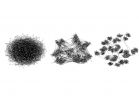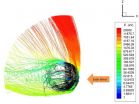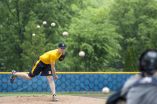(Press-News.org) PHILADELPHIA -- House calls, a long-running option dating back to the early days of medicine, can be used in a new way to improve geriatric care and lower costs, says a report issued last week from the Centers for Medicare and Medicaid Services (CMS).
Using first year results from Penn Medicine's Truman G. Schnabel In-Home Primary Care Program and its partners in the Mid Atlantic Consortium, Medstar Washington Hospital Center and Virginia Commonwealth University (VCU) along with the 16 other IAH practices nationwide, CMS announced last week more than $25 million was saved during the first year of the national Independence at Home Medicare (IAH) demonstration, averaging $3,070 per participating beneficiary while improving care and achieving high satisfaction levels for the patients. During the first year, 8,400 Medicare beneficiaries participated in the national demonstration.
The national Independence at Home Medicare (IAH) demonstration delivers home-based medical care through house calls and personalized care to Medicare beneficiaries who face limited mobility and are burdened with advanced chronic illness. Nurse practitioners and physicians work with community agencies to provide primary care and supportive services for these patients who may otherwise not be able to travel to critical medical appointments, risking deteriorating health, threatening their ability to remain in their homes.
'IAH is a clinical model that focuses the resources of an integrated provider team on the five percent of Medicare beneficiaries that drive nearly 50 percent of Medicare spending,' said Bruce Kinosian, M.D., an associate professor in the division of geriatric medicine and senior fellow at the Leonard Davis Institute of Health Economics. 'With our partnership with the Philadelphia Corporation on Aging, we have a truly integrated, effective and efficient care program providing complex medical care and the social supports that frail elders need to remain in the community, while preserving patient choice.'
While improving care and achieving high patient satisfaction, these programs reduced overall health care costs; in some cases by 20 to 30 percent. Penn Medicine, the only IAH program in the Philadelphia region, worked with its partners in the Mid-Atlantic collaborative and the Philadelphia Corporation on Aging. 'We've known for years that an integrated provider team working with patients provides effective care for medically complex, frail elders,' said Mary Ann Forciea, M.D., medical director of the in-home primary care program. 'The IAH demonstration's financing model now pays providers to deliver that type of care.'
The Penn Medicine house call team, supported for 20 years by the division of geriatric medicine, served alongside Medstar and VCU in a central role in creating and designing the demonstration to create the new option for patients. Data from the Penn team helped encourage lawmakers to include the three-year program in the Affordable Care Act.
During the first year as an Independence at Home practice, Medicare beneficiaries in the Truman G Schnabel In-Home Primary Care Program on average, had:
Fewer hospital readmissions within 30 days
Follow-up contact from their provider within 48 hours of a hospital admission, discharge, or emergency department visit
Their medications reviewed by their provider within 48 hours of discharge from a hospital or emergency room
Their preferences documented by their provider
Decreased use of hospital and emergency department services for conditions such as diabetes, congestive heart failure and COPD
'It's gratifying that our inter-professional team of geriatricians, nurse practitioners, social workers, and nurses has been so effective in serving frail elders over time, and across medical settings, to allow them to remain in the community,' said Jean Yudin, CRNP, nurse practitioner and program director of the Schnabel in-home primary care program.
INFORMATION:
Penn Medicine is one of the world's leading academic medical centers, dedicated to the related missions of medical education, biomedical research, and excellence in patient care. Penn Medicine consists of the Raymond and Ruth Perelman School of Medicine at the University of Pennsylvania (founded in 1765 as the nation's first medical school) and the University of Pennsylvania Health System, which together form a $4.9 billion enterprise.
The Perelman School of Medicine has been ranked among the top five medical schools in the United States for the past 17 years, according to U.S. News & World Report's survey of research-oriented medical schools. The School is consistently among the nation's top recipients of funding from the National Institutes of Health, with $409 million awarded in the 2014 fiscal year.
The University of Pennsylvania Health System's patient care facilities include: The Hospital of the University of Pennsylvania -- recognized as one of the nation's top 'Honor Roll' hospitals by U.S. News & World Report; Penn Presbyterian Medical Center; Chester County Hospital; Penn Wissahickon Hospice; and Pennsylvania Hospital -- the nation's first hospital, founded in 1751. Additional affiliated inpatient care facilities and services throughout the Philadelphia region include Chestnut Hill Hospital and Good Shepherd Penn Partners, a partnership between Good Shepherd Rehabilitation Network and Penn Medicine.
Penn Medicine is committed to improving lives and health through a variety of community-based programs and activities. In fiscal year 2014, Penn Medicine provided $771 million to benefit our community.
For severely obese people, bariatric surgery may have a benefit besides dramatic weight loss: it can also substantially reduce urinary incontinence.
A new investigation led by UC San Francisco is the first to examine the longer-term effects of the surgical procedure on incontinence three years after bariatric surgery. The study appears online June 22 in JAMA Internal Medicine.
'Our findings showing another important long-term benefit to bariatric surgery might help to motivate people who are severely overweight,' said first author Leslee L. Subak, M.D., a UCSF professor ...
Somehow, colorful tropical scarlet macaws from tropical Mesoamerica -- the term anthropologists use to refer to Mexico and parts of northern Central America -- ended up hundreds of miles north in the desert ruins of an ancient civilization in what is now New Mexico.
Early scientists began excavating the large Pueblo settlements in Chaco Canyon in northwestern New Mexico and found the birds' remains in the late 1890s, but only recent radiocarbon dating of the physical evidence has pushed back the time period of sophisticated Pueblo culture by at least 150 years, according ...
Social networks affect every aspect of our lives, from the jobs we get and the technologies we adopt to the partners we choose and the healthiness of our lifestyles. But where do they come from?
In a new study, the University of Pennsylvania's Damon Centola shows how social networks form and what that means for the ideas that will spread across them.
Counterintuitively, he finds that breaking down group boundaries to increase the spread of knowledge across populations may ultimately result in less-effective knowledge sharing. Instead, his research shows that best ...
CORVALLIS, Ore. - A study at Oregon State University indicates that both a high-fat and a high-sugar diet, compared to a normal diet, cause changes in gut bacteria that appear related to a significant loss of "cognitive flexibility," or the power to adapt and adjust to changing situations.
This effect was most serious on the high-sugar diet, which also showed an impairment of early learning for both long-term and short-term memory.
The findings are consistent with some other studies about the impact of fat and sugar on cognitive function and behavior, and suggest that ...
If planets had personalities, Mars would be a rock star according to recent preliminary results from NASA's MAVEN spacecraft. Mars sports a "Mohawk" of escaping atmospheric particles at its poles, "wears" a layer of metal particles high in its atmosphere, and lights up with aurora after being smacked by solar storms. MAVEN is also mapping out the escaping atmospheric particles. The early results are being discussed at a MAVEN-sponsored "new media" workshop held in Berkeley, California, on June 19-21.
The Mars Atmosphere and Volatile Evolution (MAVEN) spacecraft was launched ...
COLUMBIA, Mo. - In 1964, renowned biologists Peter Raven and Paul Erhlich published a landmark study that introduced the concept of co-evolution. Using butterflies and plants as primary examples, the team determined that two species can reciprocally drive each other's evolution and development. Now, an international team of researchers led by the University of Missouri and Stockholm University has used cutting-edge genomics to analyze the co-evolution theory and identified the mechanisms responsible for this phenomenon. Scientists believe that understanding how co-evolution ...
Our brains track moving objects by applying one of the algorithms your phone's GPS uses, according to researchers at the University of Rochester. This same algorithm also explains why we are fooled by several motion-related optical illusions, including the sudden "break" of baseball's well known "curveball illusion."
The new open-access study published in PNAS shows that our brains apply an algorithm, known as a Kalman filter, when tracking an object's position. This algorithm helps the brain process less than perfect visual signals, such as when objects move to the ...
Amid reports that rank today's teens as the most stressed generation in the country, a new study offers hope for helping them effectively manage stress and build long-term resiliency. A pilot study, published in the spring issue of the journal Advances in Mind-Body Medicine, describes how a stress-reduction/resiliency-building curriculum developed by the Benson-Henry Institute (BHI) at Massachusetts General Hospital (MGH) helped a group of Boston-area high school students significantly reduce their anxiety levels, increase productivity and effectively manage stress over ...
PROVIDENCE, R.I. [Brown University] -- Fish are power eaters. In many species, large muscles running along their backs and bellies provide bursts of speed for chasing down prey. Then, at the very instant they close in, they vacuum victims into their suddenly gaping mouths with overwhelming suction. It turns out that these power surges are no anatomical coincidence. A new study shows that largemouth bass get their slurping power from the very same muscles that provide their swimming power.
In the Proceedings of the National Academy of Sciences, Brown University researchers ...
Chemists and biologists at UC San Diego have succeeded in designing and synthesizing an artificial cell membrane capable of sustaining continual growth, just like a living cell.
Their achievement, detailed in a paper published in this week's issue of the Proceedings of the National Academy of Sciences, will allow scientists to more accurately replicate the behavior of living cell membranes, which until now have been modeled only by synthetic cell membranes without the ability to add new phospholipids.
'The membranes we created, though completely synthetic, mimic several ...




